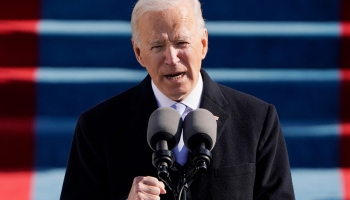How Will Joe Biden’s Presidency Affect SRI Trends?
President Biden’s administration has moved to reinstate the US as an environmental leader
- |
- Written by Tom Higgins

On his first day in office, President Biden fulfilled a campaign promise of, once again, signing the US up to the Paris Climate Agreement.
An emblematic sign of things to come, the 46th President is already shaping investment trends. Despite having a pandemic to overcome, sustainability is now on the mainstream fiscal agenda in America.
Reinstating the US as a global green power
“Folks, we’re in crisis,” were the then president-elect’s words at a December press conference to announce his environmental advisors. He made it clear that this was not just about the impact of Covid-19, but “the existential threat of our time, climate change”.
For David Harrison, portfolio manager at UK investment house Rathbone Brothers, President Biden’s positioning as a global economic and environmental leader is imperative.
“A global policy response in this area strongly needs US involvement,” Harrison says. “We expect there to be further policy announcements in the coming months, but we have already seen a significant shift versus the previous administration.”
Recasting America as an environmental powerhouse is tightly intertwined with the pandemic recovery: the administration has indicated that the country’s Covid-19 economic stimulus will be driven by environmental spending. Research from Vivid Economics found green spending under the new government is expected to grow 14-fold.
This has already affected investor habits. In the fourth quarter of 2020, flows into sustainable funds in the US doubled in comparison to the previous quarter, to a record $20.5 billion.
This is the tip of the iceberg for Biden’s administration, Harrison says. “We could see new policies around carbon pricing and potentially restrictions on new carbon-intensive projects,” the manager says, both of which could further the significant environmental swing.
Bringing regulation up to standard
President Biden is already in the process of reversing legislation from his predecessor’s regime that “conflict with important national objectives”. Recent regulation has inhibited the adoption of ESG investment practices in the US, such as the Department of Labor’s proposed rule introduced in November 2020.
“The new administration has an opportunity to align US rules with a growing body of evidence that challenges the current mindset of US legislators and regulators,” says Matthew Jennings, investment director at Fidelity International. “Current US regulation assumes that improving the sustainable characteristics of a company or portfolio means sacrificing risk-adjusted returns.”
In Europe, regulation on sustainability-related disclosures in the financial services sector, known as SFDR, will impose new rules on asset managers from March this year. It will force them to reveal the ESG considerations they have factored into their decision making.
Should comparable regulation be introduced by Biden’s administration, it may be a trigger for increased demand for robust ESG funds while acting as an incentive for others to improve.
Uniformity to boost confidence?
Likewise, implementing legislation that encourages uniformity will further develop frameworks used to describe how well a business or fund aligns to ESG ideals, creating a more robust environment for investors to base their decisions on.
A report from Schroders published last year found that 61% of investors identified the main inhibitor of investing in a sustainable fund was a lack of clear definitions on what constitutes a sustainable investment. The Sustainability Accounting Standards Board and Investment Company Institute, among others, are developing more sophisticated frameworks.
Not only would this be good for investors, but it would bolster the prospects of environmentally centric businesses and investment opportunities, argues Tony Campos, who heads FTSE Russell’s American sustainable investment arm.
He says: “The prospects for the growth of US green economy companies would be boosted if the US forges ahead with substantial legislative and regulatory progress in the space.”
By Tom Higgins













